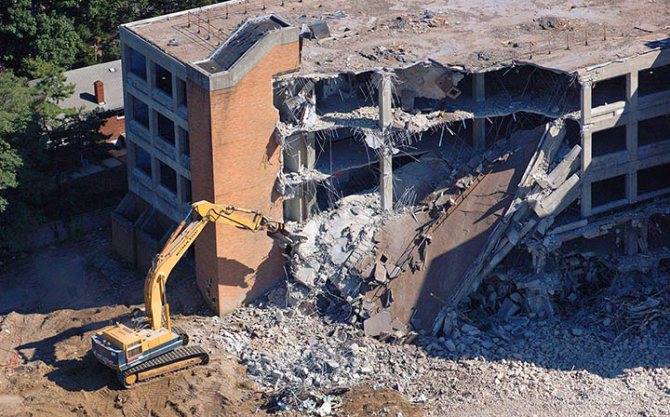Pravozhil.com > Real estate registration > Permission to demolish a private house - situations, type of demolition, where to get it, how to carry out the demolition
How to obtain permission to demolish a private house? Owners of old houses know well how much effort, money and time it takes to repair them, bring them into decent shape and maintain them.
The latter is especially labor-intensive and costly - as soon as the roof was repaired, cracks appeared on the walls, as soon as the windows were replaced, the floors became covered with dampness. As soon as the heating system was corrected, the roof leaked again. The vicious circle has no end.
And those owners who do not live in old buildings, but received them as an inheritance or in some other way, understand how unprofitable investments in such real estate are. It is much easier, cheaper and faster to demolish an old house and build a new one.
But, before embarking on the implementation of grandiose projects and dreams, it is necessary to keep in mind that in order to smoothly destroy an unprofitable dilapidated home, it is sometimes necessary to obtain permission to demolish a private house.
The legislative framework
This issue is regulated, firstly, by the Civil Code of the Russian Federation, Article 260 of which talks about the rights of the landowner.
Secondly, this is the Land Code. In particular, Article 40 of Part Two gives each legal owner of land the right to build on it, in accordance with the intended purpose of the site and the permitted use.
The third regulatory legal act is the Town Planning Code of the Russian Federation, which contains the procedure for obtaining permission, norms and rules for construction and demolition.
State needs: seizure of land and buildings on it
A house (including an apartment building) can be seized from the owner along with the land plot on which the building is located. The reason may be state or municipal needs - for example, there may be a need to build roads, lay a gas pipeline, create facilities for international sporting events, and so on. All this is provided for in Article 32 of the Housing Code of the Russian Federation.
It is almost impossible to predict the occurrence of such circumstances, as well as to appeal such a decision if it is made at the state level. Most of the litigation in such situations is related to the amount of monetary compensation, and not to appealing the decision.
Studio apartments in the old building: the main risks
Buying an apartment in Khrushchev: benefits and risks
Permission to demolish a private house - where to apply
Where to apply for permission to demolish a private house?
It is possible to obtain permission to demolish a house if there is ownership rights.
It is necessary to contact the administrative body of the municipality at the location of the object - city, town, village, and architectural bureau. There is no concept of “demolition” in the legislation.
Instead, the terms “dismantling” or “reconstruction” are used, the latter is applicable in the case when a new one of the same size and area is built on the site of a demolished building. By the way, in this situation permission is not needed.
According to the Town Planning Code, during the construction, reconstruction, dismantling, and repair of individual housing construction projects, which include houses that stand alone and have no more than 3 floors with accommodation of no more than one family, there is no need to generate project documentation, as well as state expertise for such structures are not carried out.
Documents required to obtain permission
An application for permission is submitted to the local government body, to which the following is attached:
- identification documents;
- documents on ownership of real estate;
- documents on ownership of the land plot;
- land plan.
If the house is intended for several families or has more than 3 floors, then the following are also served:
- project documentation with a set of technical papers;
- coordination with other residents and the procedure for their resettlement.
Next, having permission, the owner proceeds with the immediate demolition of the house, while observing urban planning regulations and safety measures:
- Preparing the area - installing fences to ensure the safety of neighboring areas.
- Disabling communications.
- Cleaning up the site after demolition.
- Removal of construction waste and its full disposal.
Thus, the package of documents for obtaining a permit is based on a certificate of registration of ownership, without which, no matter how enterprising a person is, it will not be possible to legally demolish the house.
Wrong dacha
Yulia Vladimirovna, how should citizens behave so that when constructing, say, a garage or a bathhouse, they do not receive a court summons upon completion of the work? And what is squatter construction according to the law?
Yulia Verbitskaya:
The concept of “samostroy” is absolutely precisely established by the Civil Code of the Russian Federation. There is Article 222, which states that “an unauthorized construction is a building, structure or other structure erected on a site that is not provided in the prescribed manner. Or on a land plot whose permitted use does not allow the construction of a given facility on it. Either the construction was done without obtaining the necessary permits or in violation of town planning and building codes and regulations.”
Until recently, this order existed. If a citizen had a registered ownership of the building, then such a document excluded recognition of the object as “self-construction.” Thus, from the moment of registration, the property was the property of a specific person recognized by the state.
But it was like that before. Effective July 13, 2020, this practice has changed. Now the person who carried out the unauthorized construction does not acquire ownership of it. In Article 222 of the Civil Code it was added that a person who has carried out an unauthorized construction cannot acquire ownership of it.
That is, it turns out that if, as expected, before the start of construction, a citizen did not receive the necessary permits, then built a house and wanted to register it, then, according to amendments to the law, he will not be able to become a full-fledged owner of the building and will not receive a certificate of ownership. But this applies to those who began construction after the adoption of the amendments. Do the changes apply to those who did not receive permits at the time, but were then able to formalize ownership?
Yulia Verbitskaya:
According to the new changes, authorities and local self-government have the right to make decisions on recognizing an object as a “self-construction”, even if the ownership rights to the object were once registered. This is stated in paragraph 4 of the same article 222 of the Civil Code.
Many people will be very concerned about this prospect. Do the owners of such real estate have a chance to defend their property?
Yulia Verbitskaya:
The building can still be recognized as property. But under a number of conditions: if the building was erected on one’s own land plot and there are rights allowing construction on it, if the building complies with the parameters of the territory’s planning, and also if the preservation of the building does not violate the rights and legally protected interests of other persons and does not pose a threat to the life and health of citizens .
How to protect yourself and your construction site?
Yulia Verbitskaya:
Recognition of a property as an unauthorized construction lies at the intersection of two codes - Civil and Urban Planning. In order to protect yourself from the possibility of recognition of property as “sabotage”, it is important that you have:
1. A plot of land suitable for construction of the facility.
2. A construction project that has received a positive expert opinion.
3. Permission to put the facility into operation (issued by a special commission in accordance with the Town Planning Code of the Russian Federation).
If all the points are met, the owner of the property is practically guaranteed against recognition of his property as “squatter construction.”
In what cases can a citizen apply to an arbitration court to protect his building from being recognized as an unauthorized construction, and what should he do to do this?
Yulia Verbitskaya:
Let's look at the situation using a simple example. For a citizen, a certain company built a 4-story residential building on a plot of land he owned based on an individual project. The administration of the locality demanded to submit documents confirming the legality of the structure. Namely: a project, a conclusion on the compliance of the constructed facility with the project, a document confirming the commissioning of the facility. In case of failure to provide documents, the administration notified the citizen that his house was included in the list of unauthorized construction projects. Then the citizen turned to the contracting company and asked to provide such documents. The contracting company did not respond. A dispute arose between the parties.
Since the contract contained an arbitration clause, the dispute ended up in the Arbitration Court of construction organizations of the city.
Design documentation was requested, and technical and forensic construction and technical examination was carried out. It turned out that the purpose of the land plot allows the construction of a 4-storey residential building, the design documentation complies with GOST standards, the completed object is of adequate quality and was built in accordance with the design documentation. All these documents were sent to the local administration. The question of including the facility in the list of unauthorized construction has been removed.
What is the role of arbitration courts in the issue of recognizing a building as legal?
Yulia Verbitskaya:
The competence of arbitration courts does not include cases of invalidating already registered property rights or invalidating decisions of government bodies to include a specific object in the list of unfinished construction projects. The jurisdiction of such disputes is arbitration courts and courts of general jurisdiction (if the rights of individuals - owners of real estate) are affected.
But if the dispute is related to the examination of a structure or compensation for losses, it can be considered by the Arbitration Court if there is an arbitration agreement in the agreement or contract. That is, an agreement between the parties to transfer the case to a specific arbitration court. If, as part of the arbitration proceedings, a town planning examination or examination of design documentation is appointed and carried out, this is serious evidence confirming the legal basis for the creation of the building.
How can an ordinary person figure out which problems of self-construction are resolved exclusively in state courts, and when a dispute can be resolved in arbitration courts?
Yulia Verbitskaya:
Everything that is related to the recognition of property rights, invalidation of a registered right, exclusion from the property register, challenging regulations and compensation for losses caused by unlawful actions of public authorities in the Russian Federation is not within the competence of arbitration courts.
However, disputes of a private law nature, if there is an agreement between the parties to consider the case by the Arbitration Court, are subject to consideration by this court, regardless of the content of the stated claims.
There was a lot of talk about squatter construction when the Moscow government recognized several objects that had a certificate of ownership as such.
Yulia Verbitskaya:
This recognition was the implementation of innovations when Article 222 of the Civil Code was amended a year ago. According to it, the person who “carried out an unauthorized construction” does not acquire ownership of it. And paragraph 4 of the same article provided for the possibility for authorities to recognize objects as “sabotage”.
But what to do in such cases, if there is a right, but the object is also being demolished?
Yulia Verbitskaya:
This practice is new, not established, and the answer to the question of how compensation for damage will be carried out to owners whose rights to real estate was registered by the state and subsequently declared insolvent at the initiative of the authorities does not currently exist.
But in global legal practice there are precedents for the demolition of objects, although owned by individuals or legal entities, but which do not fit into the urban planning concept or pose a danger. So the innovations of Article 222 of the Civil Code correspond to world practice.
But European practice provides for compensation mechanisms - they have yet to be created and implemented in our Russian legal judicial system.
Nuances
What should you pay attention to?
The demolition procedure, as mentioned above, largely depends on the nature of the work.
For example, when demolishing but leaving the foundation on which a new one will be built, a permit is not needed, since the process can be formalized as “house reconstruction” or “major renovation” - if the area of the property remains unchanged. But even if the area is increased or decreased, the BTI and state register authorities will take into account the changes that have occurred in a notification procedure.
If demolition is planned with the cancellation of the entry about it in the register, then it is also necessary to dismantle the basement part of the building, the foundation to ground level. Disconnection of communications is coordinated with the relevant utility services.
After demolition, you should contact the technical inventory authorities, whose specialists will draw up an inspection report of the structure. Based on this act, bureau employees cancel the entry about the house. Then you need to submit an application to Rosreestr to make a new entry about the termination of the existence of the house. Attached to it:
- technical passport (with a canceled entry about the house);
- a document confirming the actual existence of the house (commissioning act, which is stored in the architectural bureau, i.e., the department of architecture and urban planning).
If the house is not registered in the BTI and the title to it is not registered, the demolition is carried out without any legal registration.
Thus, the nature of the demolition of a private house depends on the presence or absence of a record about it in the inventory authority and the state register.
How to obtain permission to demolish a building under the Town Planning Code?
The procedure for demolishing a house is regulated by Ch. 6.4 Town Planning Code.
What should be done:
- Request conditions for disconnecting housing from communications, disconnect them.
- Provide notice of planned demolition work.
- Demolish housing.
- Dispose of garbage.
- Send notification of demolition completion.
- Terminate ownership rights in Rosreestr.
Let's look at each step in more detail.
Step 1: obtaining conditions for disconnecting the house from communications
The procedure for disconnecting houses from utility networks is regulated by Decree of the Government of the Russian Federation of July 3, 2019 No. 850 and regional legislative acts. It specifies the rules for disconnecting water, electricity, gas, heating and sewerage networks. If the owner wants to demolish the old house and build a new one, these rules do not apply.
To obtain shutdown conditions, you need to submit an application to the operating organization along with other documents:
- Extract from the Unified State Register of Real Estate.
- The document on the basis of which the right of ownership arose: contract of sale, gift, exchange, rent, certificate of inheritance.
- Passport.
Conditions are issued no later than 10 working days from the date of submission of the application. Disconnection is made free of charge within 30 working days from the date of issue of the conditions.
Note: there may be several operating organizations. For example, electricity is provided by the electric grid company, gas supply by Gazpromezhregiongaz LLC. And each has different shutdown conditions that need to be agreed upon and fulfilled.
Step 2: disconnecting the house from utility networks
The operating organization will notify the owner about this at least three days before the start of work. It is not necessary for the home owner to be present during the dismantling of utility networks; the main thing is to provide workers with access to them.
Based on the results of the shutdown, a corresponding act is drawn up and sent to the owner within five days.
Step 3: Submit Notification of Planned Demolition
The notification is drawn up in the name of the head of the administration of the municipality or settlement. Its form is approved by the Order of the Ministry of Construction and Housing and Communal Services, and it is sent no later than 7 days before the start of demolition work.
Contents and sample notice
What information is indicated in the notification:
- Date of preparation.
- The name of the local government body to which it is submitted.
- Information about the applicant: Full name, place of residence, TIN.
- Information about the land plot: cadastral number, address, information about title documents.
- Information about the house being demolished: cadastral number, address, title documents.
- Contact email or postal address.
- Confirmation of consent to the processing of personal data.
- List of attached documents.
- Applicant's signature.
Important! The notification can be submitted personally to the administration, through the MFC or State Services.
Documentation
When submitting a notification, you will only need your passport. Home inspection results are not required.
Step 4: demolition of a residential building and disposal of construction waste
After submitting the notification, the administration, within 7 days, places the information in the information system for supporting urban planning activities and notifies the construction supervision authority. Any organization or individual entrepreneur has the right to carry out dismantling; SRO approval is not required for such work.
Upon completion of work, construction debris must be removed. This is done by the owner or organization that carried out the demolition.
Step 5: Send Demolition Complete Notification
Notification of completion of demolition is also filled out according to the form and sent to the administration no later than 7 days after completion of the work.
Contents and sample notice
What is stated in the notice:
- Name and address of the authority to which it is submitted.
- Full name, passport details, address of the applicant.
- Information about the land plot.
- Work completion date.

Sample notification
Documentation
Along with the notification, the applicant must submit a passport or a copy thereof.
Step 6: preparation of an inspection report by a cadastral engineer
The survey report is drawn up by a cadastral engineer. The form was approved by Order of the Ministry of Economic Development No. 861. Attached to it is the owner's decision to demolish the house, as well as a notice of completion of dismantling. One copy of the act is given to the owner.
Step 7: contact Rosreestr
When all the documents are ready, you need to submit them to Rosreestr to terminate the registration of ownership of the house. He will be deregistered within 10 days. There is no state fee for this.
Note: documents can also be submitted through the MFC. You will need an inspection report, a passport, and a title document.
Expenses
Demolition requires significant costs.
Firstly, if it is difficult to dismantle the house yourself, like wooden or similar houses, then you will have to turn to the services of architectural firms specializing in such matters.
Even if the upper part of the house can be disassembled with your own hands, the foundation often has to be demolished with special equipment.
The company's engineers will prepare a demolition project, taking into account protective fences, disconnection of communications, timing and order of work, and will draw up estimates, which are recommended to be carefully studied in order to avoid excess costs.
The second cost column is garbage removal and waste disposal. If it is impossible to do this yourself, then you will have to hire specialists again, whose prices, as a rule, depend on the number of machines used to load waste.
conclusions
Demolition of a house is a labor-intensive and responsible process that should be approached consistently and competently. It is necessary to comply with legal rules and safety measures, coordinate work with neighbors and city services, and be sure to notify accounting authorities.
If you carry out the procedure correctly, point by point following the prescribed instructions, then all stages will be completed easily and calmly.
You can learn about the nuances of demolishing private houses from the video:
See also Phone numbers for consultation January 11, 2020 kasjanenko 901
Share this post
Discussion: 7 comments
- Anna says:
10/17/2017 at 00:46Often home renovations cost a tidy sum; we have also thought about building a new home more than once. I didn’t even know that you need a permit to demolish your house. The essence of the law as a whole is clear and indeed everything must be fulfilled.
Answer
- Sergey says:
01/17/2018 at 18:43
Anna, then don’t put it off. Now, while it’s winter and off-season, almost all companies have good discounts on house demolition. If from St. Petersburg, then contact dom-snos.ru
Answer
- Elena says:
01/21/2019 at 14:51
Hello, tell me how to get out of this situation. I demolished the old house, built a new one on this site, the cadastral engineer did the documentation, assigned a new cadastral number, the house number was not indicated, submitted an application to the MFC, they refused the house number, because... there is a registered previous home on it. Where to submit an application that the old house has been demolished and what to do in this case??
Answer
Masha says:
02/25/2019 at 16:36
Elena, hello. Contact a cadastral engineer, they will draw up an act. With him at the MFC.
Answer
02/15/2019 at 06:53
On my plot in the village there is an old, dilapidated house. The village is abandoned, the houses are nowhere to be found, I found out at the village administration of the district center. I'm afraid I'll break the house and then some paperwork problems will arise.
Answer
02/17/2019 at 06:24
Hello. In our village there was a house with a plot of land, we didn’t go there for about 15 years, but recently we went and it turned out that our house was demolished and a store was installed. We have all the documents in hand for the land and the house, Rosreestr went in, the house is still listed .what should we do and where should we go, since the house was illegally demolished and the site is being used?
Answer
10.21.2019 at 23:15
Hello. My neighbor and I bought a house with a plot of 20 acres. The plot was officially divided in half, but the house was not built. The house is in the middle, already old. So they decided to demolish it. In the future we want to build a duplex on this site. Maybe someone can tell me what is the best thing to do so that there are fewer problems and the money is cheaper. Do I need to obtain permission for dismantling, then connect gas and electricity, and get an address? Maybe it would be better to document the division of the house before demolition and arrange for reconstruction? What if we go beyond the limits? Is there a fine for demolition without permission?
Answer
Who does the demolition and dismantling?
Today, rarely anyone deals with the demolition of houses on their own. Still, for such work you need to have the appropriate experience, permits, sophisticated technology and equipment. Contrary to other popular belief, developers themselves do not dismantle buildings and structures. As a rule, for this they hire specialized companies with the appropriate equipment, staff and permission to perform such work.
As you can easily see, high-quality dismantling of buildings is not at all the same thing as breaking a dilapidated house into a heap with an excavator; it is quite complex and painstaking work, for which the contractor requires licenses, self-regulatory organizations, permits, approvals, a large arsenal of construction equipment and practical experience in carrying out such work.

An important factor is compliance with all safety requirements. That is why you should not do it yourself, but should turn to professionals in this field. We recommend ordering this service here: https://tehnolider-spb.ru.
The city of Lobnya: a developed suburb of Moscow
The best townhouse villages along Warsaw Highway
Construction of a house on rented land. How to rent a plot and what to consider?
Residential areas in Skolkovo
Land development from scratch. Where to begin?
How to build a spacious house or cottage on a small or narrow plot?
Is it worth buying a house with finished interior decoration or is it better to choose a cottage without renovation?
Construction of a log house. Traditional and modern technologies
Heating a country house. What types of systems are there? Their varieties and characteristics










